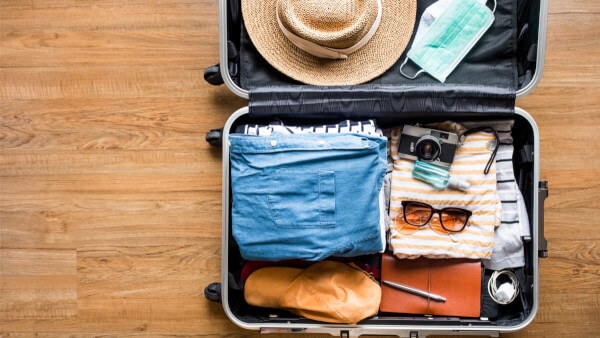Complete Guide to ING International ATM Fees: Withdrawal Fee, Exchange Rates and Rebates
Planning to use your UBank card to make ATM withdrawals internationally? Read on to understand the true cost of overseas transactions with UBank.

Want to take a little break from your life in Australia? Whether you’re jetting off for a business trip or a holiday, or even contemplating moving abroad, you’ll need to know the best way to use your money when you’re there. Whenever you go abroad, you have to take care you don’t end up spending as much on bank fees as you do on ice cream and fridge magnets - sneaky bank charges mean things often get expensive fast. So here’s a look at some of the different options for using your Australian money when abroad.
Here are the main options you’ll face, and the pros and cons of each.
In days gone by, trips abroad were often prefaced by a trip into town to get your money exchanged to the destination currency. That’s no longer necessarily the case, although of course it’s still an option. You should be aware, though, that if you want to take more than AU$10,000 in cash out of Australia, you’ll need to declare that at customs.
Hold on, though. Is it really the best option to get your cash before you travel? You might like the convenience of having it sorted in advance, but doing this has downsides - not least the fact that you then have to travel with a substantial amount of cash in your wallet or tucked into your suitcase. And of course you have to do that whether you exchange Australian dollars before you go, or carry your Australian dollars with you to exchange when you’re there. Either way, travelling with cash is just not very secure.
Plus there’s the cost element to consider. While a lot of currency exchange services offer ‘zero fees’, they’re still likely to make a tidy profit when they give you your foreign cash. That’s because they’ll probably use a marked-up exchange rate, meaning that you get far less foreign money than you would if they used the real mid-market rate. So getting foreign cash before you travel isn’t just a security risk - it’s also quite expensive.
Even if you want to use cash rather than a card during your travels, it still might be best to wait until you’re in your destination country and then simply withdraw money at an ATM. Yes, you’ll be charged for that too, but generally it works out cheaper. And this brings us onto the next point.
These days, most countries in the world have a decent network of ATMs, and if your card’s on the Visa or MasterCard network then it shouldn’t be too tricky to find somewhere you can withdraw cash. Of course it depends on where you’re travelling to, though.
As mentioned above, withdrawing money from an ATM is generally among the most cost-efficient ways to get at your money when you’re abroad. It won’t be free, though. The amount you’ll be charged varies depending on the terms of your own bank account, what sort of card you’ve got, and also potentially on the ATM you choose to use. So it’s worth doing your research. And always use a debit card rather than a credit card if you can - you might end up incurring unpleasant extra fees if you use a credit card abroad, unless you have a specialist travel credit card.
Some ATMs will offer you an option that might look appealing: the chance to withdraw cash in your home currency - Australian dollars - rather than in the destination currency. But there’s a simple rule you should follow in this case: never, ever choose your home currency. If you let the foreign ATM charge you in Australian dollars, it’ll convert the money for you via a method known as Dynamic Currency Conversion (DCC). Simply put, it’s a terrible deal, and you’ll end up with scandalously little money, compared to what you’d have got if you’d chosen to be charged in the local currency.
From some providers, you can get hold of a prepaid card designed to be used when you’re abroad. The concept is simple: load it up with however much money you want, and then use it abroad without worrying about international banking fees.
You might consider it a pro or a con that you’ll have a fixed amount you can spend - it could end up limiting how much you buy, which is great if you’re on a budget, and annoying if you’re not. What’s always a negative is that prepaid cards aren’t accepted as widely as credit or debit cards, so before getting one you should find out how much you’ll actually be able to use it once you’re there. Also check which currencies you can use it in - is it specific for US dollars, say, or can you use it in other places around the world as well? And, of course, watch out for fees.
Travelers’ checks are similar to prepaid cards, but a little more old-school - retro, if you will. You’ll have an actual paper check to deal with, that you’ll need to cash once you’re safely in your destination country. What’s great about travelers checks is that they’re easy to cancel if they get lost or stolen. What’s not so great is that you’ll need to work out how to cash them once you’ve arrived, which will be more or less straightforward depending on where you are. Find out if anyone has heard of travelers’ checks in the country you’re going to, before you go.
And the other not-so-great thing is that they’re not very good value. You might well be charged commission when you get your travelers’ check, and also face a bad conversion rate when you cash it in.
If you’re visiting friends or family abroad, there’s another option that could be worth considering. Using a specialist international transfer provider like Wise, you can send money to many countries around the world at the real mid-market exchange rate, with only one simple fee, always stated upfront. So if you can trust someone in your destination country to look after the money for you, that could be an especially convenient - and cheap - way to finance your trip.
You can send the money straight from your bank account to theirs, and could find yourself saving a lot by doing so - Wise is usually a lot cheaper than an international bank transfer.
And with a borderless account from Wise, you can store your money in over 40 currencies and get international bank details in 4 currencies - Australian and US dollars, euros and pounds sterling. There’s no monthly fee at all, and it’s free to set up. You can get a linked Wise debit card so you can use your AUD balance to pay in stores directly, and beat ATM fees entirely. See if you can get a better deal with Wise, today.
However you end up spending money overseas, good luck on your travels - and make sure you don’t end up paying the banks more than you have to.
This publication is provided for general information purposes only and is not intended to cover every aspect of the topics with which it deals. It is not intended to amount to advice on which you should rely. You must obtain professional or specialist advice before taking, or refraining from, any action on the basis of the content in this publication. The information in this publication does not constitute legal, tax or other professional advice from TransferWise Limited or its affiliates. Prior results do not guarantee a similar outcome. We make no representations, warranties or guarantees, whether express or implied, that the content in the publication is accurate, complete or up to date.
*Please see terms of use and product availability for your region or visit Wise fees and pricing for the most up to date pricing and fee information.
This publication is provided for general information purposes and does not constitute legal, tax or other professional advice from Wise Payments Limited or its subsidiaries and its affiliates, and it is not intended as a substitute for obtaining advice from a financial advisor or any other professional.
We make no representations, warranties or guarantees, whether expressed or implied, that the content in the publication is accurate, complete or up to date.

Planning to use your UBank card to make ATM withdrawals internationally? Read on to understand the true cost of overseas transactions with UBank.

Wondering if Travel Money Oz is the right solution for you? Our guide outlines everything you need to know about their currency exchange and travel money cards.

If you're trying to decide between Travelex and Travel Money Oz for your international money needs, read on for our side-by-side comparison of the features.

Side-by-side Comparison of Westpac Travel Card vs Wise Travel to help Australian users decided which is a better travel card for spending abroad.

Looking for a card for international transactions while traveling overseas? Read on for our guide to the options available with Macquarie Bank.

Looking for a card for international transactions while traveling overseas? Read on for our guide to the options available with ME Bank.